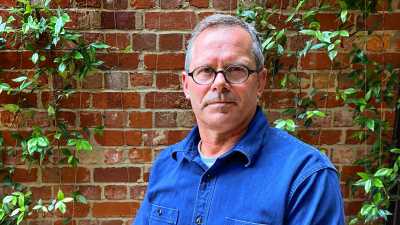Save articles for later
Add articles to your saved list and come back to them any time.
Fifty years ago, Tim Courtney was a terrified young boy silenced by the teachers he says abused him at his primary school.
On Monday, he became the first public witness in Victoria’s special inquiry investigating historic sexual abuse at 24 government schools, including Courtney’s former school, Beaumaris Primary.
Victim-survivor Tim Courtney was the first public witness in Victoria’s inquiry into historic child sexual abuse at 24 schools.Credit: Sherryn Groch
In a hearing room in Collingwood, about 23 kilometres away from the beachfront suburb where he grew up, Courtney recalled how excited he was for his first day of school.
“I was a happy child, I think fairly well-behaved,” he told the inquiry.
But when the alleged abuse began, he said his personality changed overnight. He became withdrawn and anxious; he would zone out in class. His grades “fell off a cliff”, and he developed a speech impediment.
“I tried to send signs,” he said. “[but] I was threatened … if I told anyone, I’d be harmed.”
Ribbons on the fence at Beaumaris Primary School when the board of inquiry was announced in June.Credit: Penny Stephens
Only as an adult would he learn that his mother had gone down to Beaumaris Primary at the time to find out why her son’s behaviour had changed. But still, nothing was done. “The abuse continued for years,” he said.
The alleged sexual abuse of Victorian school children like Courtney in the 1960s to the 1990s, as well as the lack of response from the Education Department at the time, is being examined in the long-awaited inquiry into historic child sexual abuse at Beaumaris and other state schools.
Former premier Daniel Andrews announced the inquiry earlier this year in response to the allegations of historic abuse at Beaumaris Primary brought forward by Courtney and others, pledging $4.5 million to run it and support survivors.
The inquiry was later expanded to 23 other schools, where the alleged perpetrators from Beaumaris also worked.
Three alleged perpetrators have been named by the inquiry so far: Grahame Harold Steele, David Ernest Keith MacGregor and Gary Arthur Mitchell. All are former teachers at Beaumaris Primary and other government schools. Mitchell has already been convicted of historic child sexual abuse he committed from the 1960s to the early 2000s.
Courtney told the inquiry how another teacher, who cannot be named for legal reasons, had abused him in front of Mitchell in a classroom in the 1970s, after which Mitchell allegedly began abusing him too.
Survivors have named other alleged perpetrators to the inquiry, with many witnesses already giving private testimony before the public hearings.
Counsel assisting Fiona Ryan, SC, said the inquiry would name perpetrators when it was legally able to do so. It had already used its powers to call for documents from the Education Department, Justice Department and Victoria Police.
But some have questioned why the inquiry has not been extended to all government schools, which experts say was a setting overlooked during the Royal Commission into Institutional Responses to Child Sexual Abuse nearly a decade ago.
Counsel Assisting Fiona Ryan, SC, in her opening address to the inquiry on Monday.Credit: AAP
Speaking after giving his testimony on Monday, Courtney said he hoped that by focusing on one cluster of abuse, the inquiry could report back quicker with meaningful reform ideas that could inform how other cases are handled and survivors supported.
But he stressed it was not enough for the government to simply apologise – the failures of the department of the day must be acknowledged too, he said.
“I hope a lot more will come out now at this inquiry,” he said. “The patterns, how perpetrator teachers [seemed to have been] moved around between schools.”
Inquiry chair Kathleen Foley, SC, opened the hearings by praising the courage and strength of survivors and vowing to create a public record bearing witness to the abuse. “We know that for some victim-survivors who come to us, this has been the very first time they have felt heard,” Foley said.
“It can be confronting for the community to be exposed to this kind of trauma, but it is even more difficult to live through it… [It] can cost lives.”
Ryan spoke of survivors plagued by depression, addiction and relationship problems, and impacts rippling through whole families. Many were dismissed or ignored when they tried to disclose the abuse as children, she said, or shame and stigma stopped them from speaking up.
When Courtney had children of his own, he said he was gripped by anxiety whenever he picked them up at the school gate. He would hang around, getting to know their teachers.
His voice shook as he recalled the day his son graduated from primary school, and he thanked the school’s head for giving his child a safe place to learn.
Courtney stressed that victims needed a one-stop-shop where they could get support after disclosing abuse and that avenues for others to report suspected abuse needed to be streamlined into one independent body.
He said he felt compelled to report his abuse to police as an adult because he feared other children could be at risk, and he is sharing his story with the inquiry for the same reason.
“But I know this is having an impact on those schools today when Beaumaris is probably a great school now,” he said.
Still, he hoped speaking out would help everyone in the community – perhaps even Courtney himself.
If you or anyone you know needs support, you can contact the National Sexual Assault, Domestic and Family Violence Counselling Service on 1800RESPECT (1800 737 732).
Most Viewed in National
From our partners
Source: Read Full Article



